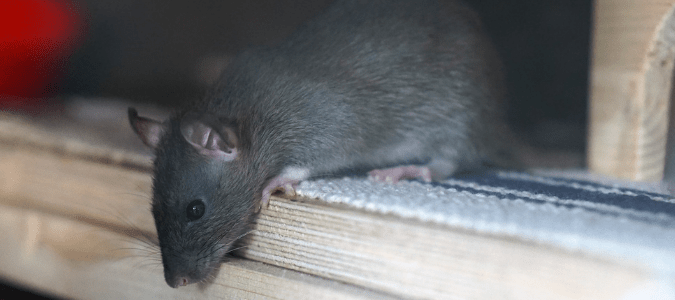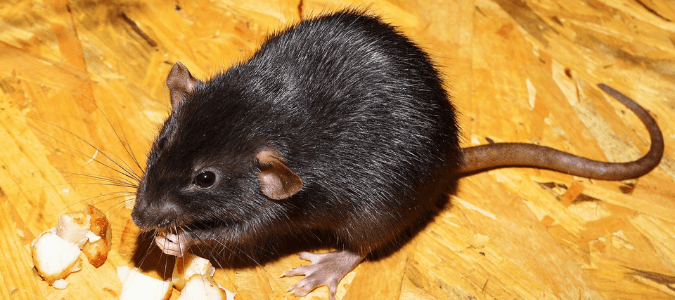What To Do About Rats in Garage

Rats carry bacteria and diseases like salmonella, hantavirus, leptospirosis and plague. Their nests, urine and feces can also transmit these illnesses. Even breathing in rat poop while cleaning up a rat infestation can cause you to contract hantavirus. For all these reasons, it is extremely important to take a rat problem seriously.
Here are some common signs of rats in the garage:
- Droppings in corners, on the top of cabinets, under appliances or elsewhere. Rat droppings are dark brown or black pellets that are a half-inch or so long, with rounded ends. Over time, they typically dry out and lose color, eventually turning gray. The darker the color, the fresher the droppings. This can give you an idea of how current or active the rat infestation may be.
- Shredded paper, fiberglass insulation or other items that rats may have used for nesting materials.
- Gnaw marks on baseboards, rafters, cabinets, wires, PVC pipes or other areas.
- Gnawed or torn food packaging, if you store extra food in your garage.
- Scratching or squeaking noises. These might be easier to hear in the dark, since rats tend to be more active at night than during the day. You or your pet might also hear rats in your ceiling or inside your walls
- Greasy, dark smudge marks along baseboards or the upper part of the walls. These come from the natural oils found in rats’ fur, which rub off on walls as rats follow familiar paths between their nest and their habitual food and water sources.
- Spotting a rat, whether dead or alive.
If you spot any of these signs of rats in your garage or anyplace else around your home or property, it’s time to reach out to a pest control specialist. A professional can inspect your property. They will look for signs of rat activity and figure out where rats are getting into your home or garage and what is attracting them. Then, they will develop a customized, comprehensive treatment plan.
Tackling a rat problem on your own isn’t a good idea because it’s likely to grow worse while you’re testing out different products and techniques. A pest control specialist has access to the most effective ways of getting rid of a rat infestation. A pro can also advise you on ways to prevent rats from returning in the future.
While it’s best to enlist professional help in dealing with a rat problem, there are several things you can do to make your garage less attractive to rats:
- Reduce clutter. Rats love cluttered spaces because they offer so many hiding places and plenty of things to gnaw on. Getting rid of old boxes and unused items will reduce the places where rats can nest and hide.
- Close off entry points. Rats can squeeze through surprisingly tiny openings to get into a home or garage. If you see holes or gaps leading inside, you can close them off with caulk, wire mesh or steel wool. This will prevent pests from getting in.
- Cut off access to food and water. If you store garbage, recycling or compost bins in or near the garage, make sure they have well-fitting lids that don’t allow rats to get inside. Dump out pets’ food and water bowls at night so they don’t attract pests. Resolve any leaky faucets or pipes, so rats can’t use these for drinking water.
- If you have trees in your yard that produce fruits or nuts, it’s a good idea to regularly rake up the fallen fruit. Otherwise, these are sure to draw rats, not to mention mice, roaches and other undesirable pests.

Do Rats Smell?
Do rats smell? This is a question pest management specialists field a lot. The simple answer is yes, rats do have a recognizably musky smell. Rat urine and feces also carry a distinct, pungent smell, so their nests may hold this same scent. And, if you’ve ever smelled a dead rat decomposing in your walls or attic, you know rats give off a very strong, very unpleasant smell when they die.
The smell of rats, or of their urine and droppings, is often one of the first signs a homeowner notices that indicates a rodent infestation. The homeowner may not recognize what the smell is coming from, but they know it’s not a good sign. Rat urine has a strong smell like ammonia that makes you wrinkle your nose, but try not to breathe it in. Rat urine and droppings can transmit airborne diseases that could make you sick.
If you notice any strange smells in your home or garage that you suspect could be coming from rats, it’s time to contact a rodent control professional. Getting your home professionally inspected and treated for pests is the best and fastest way to resolve rat problems.

Does Bleach Keep Rats Away?
Another common question people ask pest control professionals is, “Does bleach keep rats away?” Some people do find that the strong, pungent smell of bleach can deter rats. Keep in mind that if you use this strategy, you should dilute the bleach instead of using it at full strength. Pure bleach fumes could irritate your skin, eyes and lungs, and those of any other person or pet that gets near the bleach.
Most of all, it is important to keep in mind that bleach is not a complete pest control strategy. It may help keep rats away when used in combination with other, more targeted and effective approaches. There are several things you can do to make your home less attractive to rats and other pests. These steps include the following:
- Keeping all food in the refrigerator or else in air-tight containers that rats can’t access
- Resolving water leaks and drainage issues so rats don’t have access to drinking water
- Clearing away storage boxes and clutter from your garage or your home so rats don’t have ready-made hiding spaces or nesting materials
- Closing off any small holes or gaps that rats may be using to get into the home or garage with steel wool, caulk or wire mesh
These steps won’t eliminate an infestation, but they will help prevent one from occurring. If you have an active rat problem in your garage or elsewhere on your property, it’s time to contact a pest control professional. These specialists have the best, most up-to-date tools for getting rid of rats and keeping them away from your home. Their proven products and strategies will work efficiently, so you don’t have to worry about getting rid of rodents yourself.
Chem-free Can Control the Rodents on Your Property
Unfortunately, rodent populations can grow out of control. For an effective, low-impact approach to rodent control, contact Chem-free Pest Control. We create our pest control plans with your children’s well-being in mind, as well as your furry family members. Our specialists will be able to locate all rodent hiding spots. Then, we will remove them from your property, so you don’t have to worry about any more unwanted house guests.
Need Help Managing Pests?
Chem-Free offers both effective, low-impact pest control options and preventative measures to help avoid future infestations. Contact us today for a free estimate!


